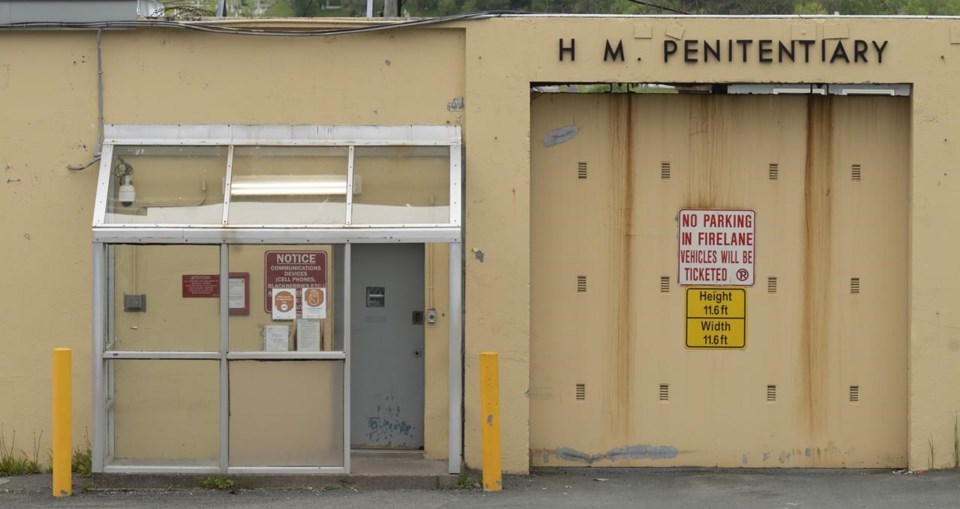ST. JOHN'S, N.L. — Two men incarcerated at Newfoundland and Labrador's largest jail say inmates are struggling with hopelessness, desperation and worsening mental health as they allegedly spend days locked in their cellblocks without family visits, counselling or trips outside.
Kevin Reid said men inside Her Majesty's Penitentiary feel they can't show any vulnerability or emotion. As their distress grows, they have nobody to turn to about their mental state.
"To be honest, there are guys here whose mental illnesses are deteriorating by the day," Reid said in a recent phone call from inside the St. John's jail. "Guys here are feeling like they're lost, like there's no hope. I mean, we're not having contact with family, we're not being able to see our friends."
Those who open up and say they're suicidal are put into isolation cells, he said.
The penitentiary first opened in 1859, and its crumbling walls and outdated infrastructure are well documented. Its razor-wired walls loom over Quidi Vidi Lake, in a residential area near the downtown core of St. John's.
Officials confirmed last week than an inmate died inside the jail on Tuesday evening, marking at least seven deaths in custody in the province to be reviewed or investigated since 2017.
The province has the highest rate of inmate suicide in Atlantic Canada by jail capacity, according to figures from all four provincial governments. Five inmates in provincial facilities died by suicide between 2010 and 2020 in Newfoundland and Labrador, where there are 281 beds across the province's jails. By comparison, five people died by suicide in Nova Scotia jails in that same decade. Nova Scotia has a provincial inmate capacity of about 700.
New Brunswick reported one inmate death by suicide in that time. Prince Edward Island reported none.
Newfoundland and Labrador's Justice Department provided no details about the identity of the inmate who died last week, or how they died. The department did not respond to a request for comment.
Reid said inmates have been offered no counselling to deal with the death, adding that they rarely have access to counsellors or psychologists at all. Rehabilitation programming -- mindfulness sessions, addiction recovery groups, Alcoholics Anonymous -- is routinely cancelled "every day," he said. The jail is facing persistent staffing shortages, and inmates are told there aren't enough guards to let them out of their ranges to gather for meetings, he said. Recreation, including time in the gym, has also been cut back drastically due to staffing shortages, eliminating a crucial outlet for inmates to work off increasing tension, he said.
Jonathan Payne said that he had only been outside a few times all summer, also because of staffing shortages. Visits with his family -- even those scheduled for video -- have also been routinely cancelled because there aren't enough guards.
He was distraught as he described feeling rodents crawl over his body while he tried to seek relief from the sweltering heat inside the 164-year-old facility by sleeping on the concrete floor.
"This place is infested," he said. "We're breathing in ... rat urine and mice urine." Mice droppings fall from the vents when any air blows through them, Reid added. Payne said there is little hope for recovery or rehabilitation in the jail, and people leave in much worse shape than when they arrived.
"We're like cows going to the slaughter," he said. "We have rights that are not being met. And we're not as bad as people make us out to be. A lot of us actually want help, and we can't get it."
Sheila Wildeman, a law professor at Dalhousie University who is part of Nova Scotia's East Coast Prison Justice group, condemned the conditions inside Her Majesty's Penitentiary. Across the country, staffing shortages are leading to unacceptable lockdowns and other harsh conditions for inmates in provincial facilities, she said in an emailed statement earlier this week.
The group is calling for more transparency about deaths and conditions in jails from provincial governments.
"However, the most obvious and constructive thing we can do to prevent further deaths and other grievous harms to the health and human rights of the nation’s most vulnerable is invest in the social determinants of health, and moreover, to do so in a way that puts a priority on those experiencing intersecting forms of oppression and vulnerability," Wildeman wrote.
The Newfoundland and Labrador government has promised to build a new jail to replace the crumbling penitentiary. A contract was awarded last year to begin clearing land for the new building.
The province also set aside money to cover part of the tuition for 13 people to obtain certification as correctional officers at the Atlantic Police Academy in P.E.I., beginning in 2024.
This report by The Canadian Press was first published Aug. 30, 2023.
Sarah Smellie, The Canadian Press




